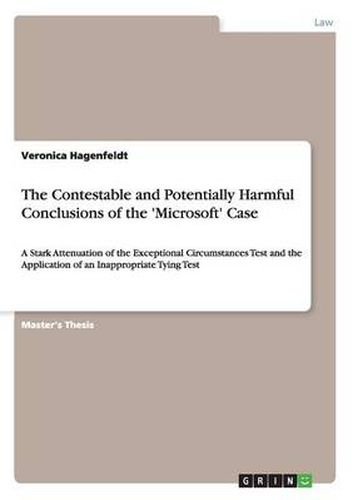Readings Newsletter
Become a Readings Member to make your shopping experience even easier.
Sign in or sign up for free!
You’re not far away from qualifying for FREE standard shipping within Australia
You’ve qualified for FREE standard shipping within Australia
The cart is loading…






Master’s Thesis from the year 2009 in the subject Law - Media, Multimedia Law, Copyright, grade: Distinction, University of Edinburgh (School of Law), course: Master Thesis in the LLM in European Law Programme, language: English, abstract: In what has been described as the most important competition law case in EU history the CFI upheld the Commission’s finding that Microsoft was guilty of committing two infringements of EC competition law: illegitimately to have refused to supply intellectual property (IP) protected interoperability information to competing workgroup server operating systems (WGSOS), and to have performed an illegal tie of its Windows Media Player (WMP) to its dominant operating system. Microsoft has been labelled the biggest encroachment on intellectual property in European competition law history and it is accused of hampering innovation and interfering with beneficial product integration by applying an anachronistic form-based tying test. In the opinion of the author the Judgment is an esoteric masterpiece of obfuscation that despite its considerable volume does little to provide legal certainty regarding the conditions under which compulsory licensing of IP rights (IPRs) will occur, or when technical integration will be deemed legal. Microsoft is of ever-increasing relevance for legal academics and undertakings alike for several reasons: First, since it is the most high profile ruling on the two most controversial issues within EC competition law - compulsory licensing of IPRs and tying - the Judgment will be a fundamental point of reference, especially amid claims that competition authorities’ concerns regarding the acquisition and use of IPRs are increasing and that legitimate worries of IP owners (IPOs) are accordingly engendered. Second, high tech markets are increasingly important to consumers and to the global economy, and Microsoft is the focal point for the ongoing debate about the future direction of the software business because i
$9.00 standard shipping within Australia
FREE standard shipping within Australia for orders over $100.00
Express & International shipping calculated at checkout
Stock availability can be subject to change without notice. We recommend calling the shop or contacting our online team to check availability of low stock items. Please see our Shopping Online page for more details.
Master’s Thesis from the year 2009 in the subject Law - Media, Multimedia Law, Copyright, grade: Distinction, University of Edinburgh (School of Law), course: Master Thesis in the LLM in European Law Programme, language: English, abstract: In what has been described as the most important competition law case in EU history the CFI upheld the Commission’s finding that Microsoft was guilty of committing two infringements of EC competition law: illegitimately to have refused to supply intellectual property (IP) protected interoperability information to competing workgroup server operating systems (WGSOS), and to have performed an illegal tie of its Windows Media Player (WMP) to its dominant operating system. Microsoft has been labelled the biggest encroachment on intellectual property in European competition law history and it is accused of hampering innovation and interfering with beneficial product integration by applying an anachronistic form-based tying test. In the opinion of the author the Judgment is an esoteric masterpiece of obfuscation that despite its considerable volume does little to provide legal certainty regarding the conditions under which compulsory licensing of IP rights (IPRs) will occur, or when technical integration will be deemed legal. Microsoft is of ever-increasing relevance for legal academics and undertakings alike for several reasons: First, since it is the most high profile ruling on the two most controversial issues within EC competition law - compulsory licensing of IPRs and tying - the Judgment will be a fundamental point of reference, especially amid claims that competition authorities’ concerns regarding the acquisition and use of IPRs are increasing and that legitimate worries of IP owners (IPOs) are accordingly engendered. Second, high tech markets are increasingly important to consumers and to the global economy, and Microsoft is the focal point for the ongoing debate about the future direction of the software business because i